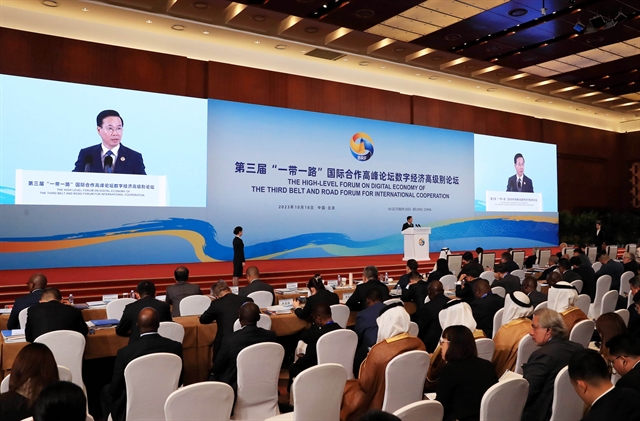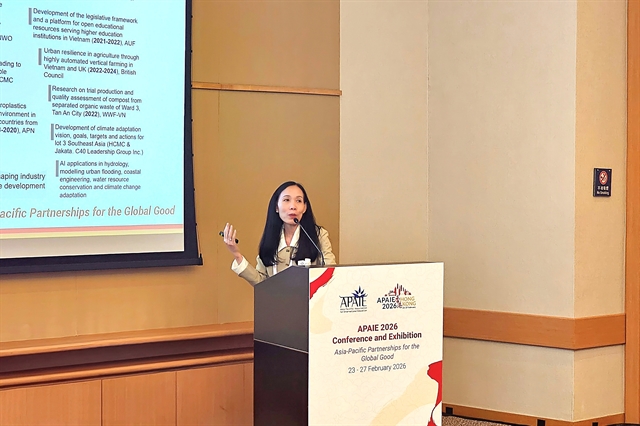 Politics & Law
Politics & Law


|
| President Võ Văn Thưởng addresses the high-level forum on digital economy as part of the third Belt and Road Forum for International Cooperation in Beijing, China, on Wednesday. — VNA/VNS Photo Thống Nhất |
BEIJING — Vietnamese President Võ Văn Thưởng on Wednesday appreciated the Belt and Road initiative as a major international cooperation mechanism that contributes a great deal to global infrastructure connectivity.
He made the statement as he addressed the high-level sessions focusing on digital economy, green development, and regional connectivity held as part of the third Belt and Road Forum for International Cooperation (BRF 3) in Beijing, China.
President Thưởng said with high commitment to substantial investment, numerous programmes and projects, and specific actions, the Belt and Road initiative has become a major international cooperation mechanism with significant contributions to infrastructure connectivity, global economic integration, an all-encompassing, high-quality framework for cooperation, and tangible benefits for all participating parties, deepening friendship and solidarity among peoples of various nations.
The President also affirmed Việt Nam's support for initiatives that promote peace and development regionally and globally, welcoming and actively participating in many important global initiatives initiated by China.
Discussing the digital economy as a new driver of growth, President Thưởng underscored that digital transformation is an inevitable trend that is happening rapidly and extensively worldwide, driven by new technological breakthroughs and modernisation.
The development of digital economy opens up enormous potential and new development space, and enables countries to connect with each other faster, he noted, adding that every country will participate more deeply into the global digital economy and become an indispensable part of it.
However, digital economy also carries security and social risks if not "appropriately oriented and managed."
The Belt and Road cooperation has seized this trend and made significant contributions to the dramatic transformation of countries along the Digital Silk Road, from modern digital infrastructure and smart cities to vibrant digital trade activities.
President Thưởng shared that Việt Nam places great importance on its connections to the world, whether on land, in the air, on the sea, or in cyberspace.
Việt Nam is striving to accelerate digital transformation, economic development, and the restructuring of its economy in line with innovative growth models.
Việt Nam sees digital economy as the new territory; digital workforce, digital technology and data as the new labour force; and digital innovation as the new driver of growth.
In recent years, the growth rates of digital economy in Việt Nam have been impressive and contributed 14.26 per cent of the national GDP in 2022, and aiming for 20 per cent of GDP by 2025 and 30 per cent of GDP by 2030.
To ensure the balanced interests of all countries and provide practical benefits to all citizens during the digital transformation and digital economic development process, President Thưởng proposed three pillars of digital economy cooperation.
First, cooperation on digital governance to establish appropriate regulations, ensuring data flow and security, creating a friendly business environment, preventing transnational crimes, and safeguarding national security and sovereignty while taking into account the development levels and specific characteristics of each country, ensuring a balance of interests and equality among all parties.
Second, cooperation on digital infrastructure to ensure and enhance the participation capacity of countries in the global digital economy. President Thưởng called on international financial organisations and companies to invest in infrastructure projects in Việt Nam and the region.
Third, cooperation on digital human resources to develop high-quality human resources with capabilities in research and development, and application of technologies, especially new and advanced technologies. The Vietnamese President underlined the need to promote knowledge and technology transfer projects in the digital economy.
During the discussions, leaders and delegates from different countries have also shared their assessments of the ongoing challenges facing the global economy, particularly the risks of economic recession and the increasingly severe impact of climate change and pandemics.
With the aim of stimulating new growth, there were many discussions regarding the experiences of building a digital economy, greening traditional industries, transitioning to clean energy, improving international infrastructure, as well as innovative solutions to address common regional and global challenges.
Delegates agreed to focus on promoting growth model transformation, further connecting economies, and harnessing science and technology innovation as a true catalyst for growth and improved livelihoods.
In addition to accelerating the adoption of digital technology in economic activities and social life, there was an emphasis on effectively addressing cybersecurity issues and building a global management system for artificial intelligence.
Leaders also emphasised the need for enhanced coordination among nations and international organisations to attract resources and support developing countries in their industrialisation and modernisation efforts while narrowing the development gap and benefiting from emerging development trends. — VNS




